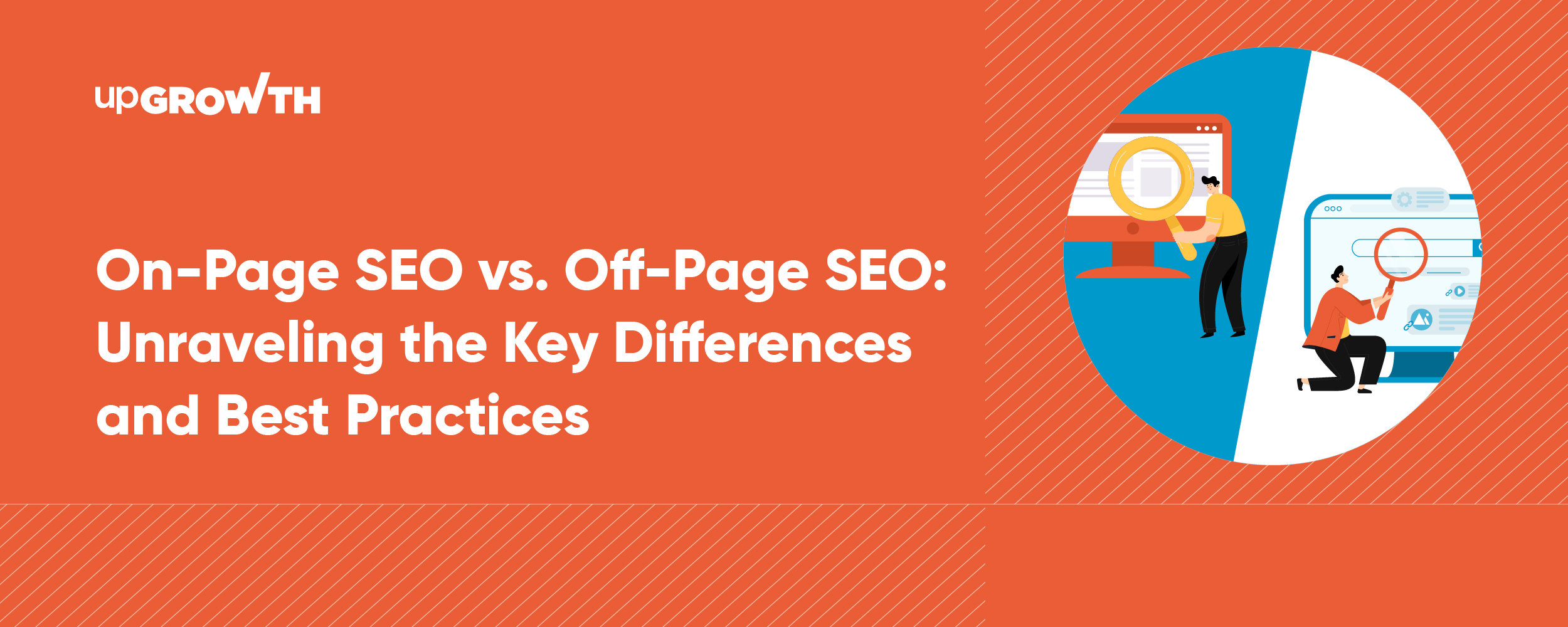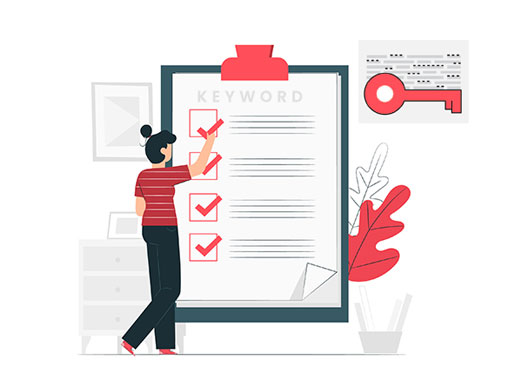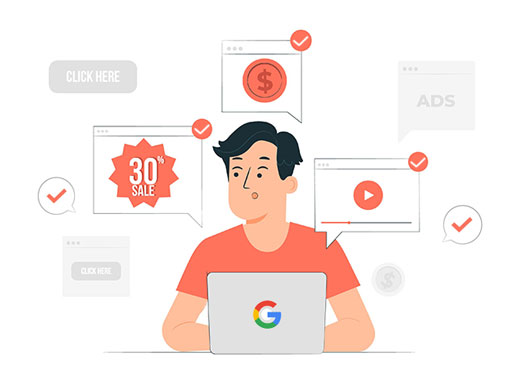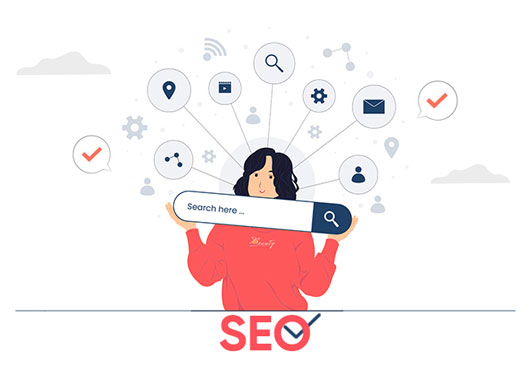On-Page SEO vs Off-Page SEO: Unraveling the Key Differences and Best Practices
Contributors:
Amol Ghemud
Published: March 14, 2024

Mastering the art of Search Engine Optimization (SEO) has become a non-negotiable skill for anyone looking to enhance their online visibility and outrank the competition. However, SEO is not a one-size-fits-all strategy; it’s a complex web of on-page and off-page practices that work together to boost your website’s ranking on search engines. But what exactly is on-page SEO, and how does it differ from off-page SEO?
This blog aims to demystify the often-confusing distinctions between on-page and off-page SEO, providing a clear understanding of what each entails and how they influence your website’s search engine ranking.
What is SEO?
Search Engine Optimization (SEO) is the art and science of enhancing your online presence to increase visibility and attract more traffic to your website through organic search engine results. It’s a fundamental aspect of digital marketing that influences how your site ranks on search engines like Google, Bing, and Yahoo.
SEO involves optimizing various elements of your website and content, so search engines deem it valuable and relevant to users’ search queries. This optimization helps search engines understand and index your website more effectively and improves user experience, making it more likely for visitors to stay, interact, and convert.
SEO can be broadly categorized into three main types:
- On-Page SEO
- Off-Page SEO
- Technical SEO
What is On-page SEO?
On-page SEO refers to the practice of optimizing elements directly within your website to improve its position in the search engine results pages (SERPs). It’s about making your site more accessible and readable for search engines and users alike, enhancing visibility and the user experience. On-page SEO is controllable by you—the website owner or marketer—because it involves aspects that you can directly manage and improve.
Key Elements of On-Page SEO
- Content Quality and Relevance: The cornerstone of any successful SEO strategy is high-quality, relevant content that answers the needs and questions of your audience. Engaging, original content optimized with targeted keywords helps search engines understand and rank your pages.
- Keywords: Thoughtful and strategic use of keywords throughout your content, including titles, headings, and body text, helps signal to search engines what your page is about. However, keyword stuffing is to be avoided; relevance and context are crucial.
- Meta Tags: This includes title tags and meta descriptions that appear in search results. Well-crafted meta tags can improve click-through rates by giving searchers a quick insight into the content’s topic.
- URL Structure: Simple, descriptive URLs enhance the usability and accessibility of your site, both for search engines and for users.
- Internal Linking: By linking to other pages within your website, you help search engines discover more content and understand the structure and hierarchy of your site, which can boost the ranking of key pages.
- Image Optimization: Including keywords in the file names of your images and alt text descriptions helps search engines interpret your images, contributing to better visibility.
- User Experience (UX): Search engines favor websites that provide a good user experience, which includes fast page loading times, mobile-friendliness, and intuitive navigation.
Best Practices for On-page SEO
Optimizing your website for search engines is an ongoing process. To make the most of on-page SEO, here are some tried and tested best practices that can help improve your site’s ranking and visibility:
1. Focus on High-Quality, Relevant Content
Ensure your content provides real value to your audience, addressing their questions, needs, and interests. Use keyword research tools to find terms and phrases your target audience is searching for, but always prioritize natural integration over forced stuffing. Keep your content fresh and updated; search engines favor actively maintained websites.
2. Optimize Meta Tags and Titles
Keep your titles under 60 characters to ensure they display properly in search results. Include the primary keyword towards the beginning. Write compelling meta descriptions (under 160 characters) that include key phrases. They should entice users to click through to your site.
3. Streamline Your URL Structure
Keep URLs short, readable, and keyword-rich. Avoid complex strings and unnecessary parameters. Separate words in URLs with hyphens, not underscores, for better readability.
4. Leverage Internal Linking
Use internal links to guide users to relevant content, helping search engines understand site structure and page hierarchy. Use descriptive anchor text that gives an indication of the linked page’s content.
5. Optimize Images
Ensure images are optimally compressed to reduce load times without sacrificing quality. Use descriptive, keyword-rich alt text for all images, aiding both accessibility and indexation by search engines.
6. Enhance User Experience (UX)
Ensure your site is fully responsive and provides a seamless experience across all devices. Use tools like Google’s PageSpeed Insights to identify and fix issues slowing down your site. Structure your site with clear, logical navigation to help users find what they need quickly.
7. Utilize Schema Markup
Implement schema markup to help search engines understand the context of your content, enabling rich snippets in search results which can improve click-through rates.
What is Off-page SEO?
Off-Page SEO involves the actions taken outside of your website to impact your rankings within search engine results pages (SERPs). This external optimization strategy is crucial for improving a website’s perception of popularity, relevance, trustworthiness, and authority. It primarily revolves around building backlinks, but it encompasses much more, influencing how search engines and users perceive the overall authority and value of your website.
Key Elements of Off-page SEO
- Backlinks: Backlinks are links from other websites to yours. They act as votes of confidence from external sources, indicating to search engines that your content is valuable and trustworthy.
- Social Media Engagement: While social signals are not a direct ranking factor, the presence and engagement level on social media can amplify your content’s reach and increase the chances of getting backlinks.
- Guest Blogging and Influencer Marketing: Contributing to other reputable sites and collaborating with influencers can expand your reach, build your reputation, and indirectly boost your SEO through additional backlinks and mentions.
- Brand Mentions: Search engines also consider implied links, instances where your brand or website is mentioned without a direct link. These mentions contribute to your site’s authority and trust.
- Local SEO: For businesses with a physical location, local SEO is a significant component of off-page optimization. This includes creating and optimizing a Google My Business listing, managing local citations, and gathering online reviews.
Best Practices for Off-page SEO
To truly excel in the digital realm, you must extend your SEO efforts beyond your own website. Off-page SEO is all about enhancing your site’s authority and reputation through strategic external efforts. Here’s how to do it effectively:
1. Cultivate High-Quality Backlinks
Produce high-quality, shareable content that naturally garners links from reputable sites. Contribute valuable content to authoritative blogs in your industry to gain backlinks and exposure. Identify broken links on external sites and offer your content as a replacement.
2. Leverage Social Media Platforms
Maintain an active and engaging presence on major social media platforms relevant to your audience. Regularly share your content and engage with users to increase visibility and the potential for links.
3. Engage in Community and Forum Participation
Participate in online communities and forums by providing helpful answers and resources, including content from your website where relevant.
4. Implement Local SEO Strategies
Create and optimize your Google My Business listing for local search visibility. Ensure your business is listed in local directories and that your information is consistent across these platforms. Encourage satisfied customers to leave positive reviews on various online platforms.
5. Build Relationships with Influencers
Connect with influencers in your niche to collaborate on content that includes a mention or link back to your site.
6. Monitor Your Off-Page SEO Activities
Regularly monitor your backlink profile to ensure you’re gaining quality links and to disavow any toxic links that could harm your ranking. Use tools to monitor brand mentions across the web, and capitalize on any opportunities for engagement or link acquisition.
Weighing On-Page vs Off-Page SEO
In the tug-of-war for search engine dominance, on-page and off-page SEO are both pulling for your site’s success, but understanding their respective weight in the SEO landscape is crucial for a well-rounded strategy.
1. The Balance of Power
On-page SEO is foundational, equipping your website with the necessary elements search engines require to understand and rank content. It’s directly within your control, allowing you to optimize for specific keywords, improve user experience, and ensure that your site is technically sound.
Off-page SEO, on the other hand, is like the reputation of your website in the broader online community. It’s shaped by backlinks, social signals, and other external factors that vouch for the quality of your content. While you can influence off-page SEO, it involves the perceptions and actions of others, making it a more indirect but powerful SEO force.
2. Complementary Forces, Not Competitors
While on-page SEO might seem to carry more immediate weight because of its direct nature, off-page SEO is a powerful amplifier of your site’s authority and trustworthiness. Search engines use off-page factors to gauge how the world perceives your site. If your on-page SEO is the “talk”, then off-page SEO is the “endorsement” from the crowd, reinforcing your site’s standing.
3. Integrated Approach for Maximum Impact
The question of how much weight to give each SEO aspect isn’t about choosing one over the other but rather understanding how they complement each other. Excellent on-page SEO without robust off-page SEO might limit your visibility, failing to signal authority to search engines. Strong off-page SEO without solid on-page SEO is like having good references for a job interview but showing up unprepared; your site needs to live up to the hype created externally.
Conclusion
As we’ve navigated the distinct yet interwoven landscapes of on-page and off-page SEO, it’s clear that the most effective SEO strategy harmonizes the two. It’s not a question of which is more important; rather, it’s about understanding how they complement each other to create a cohesive SEO strategy. Like two sides of the same coin, on-page and off-page SEO work best when aligned towards a common goal—improving your site’s visibility and ranking in SERPs.
In the end, the cumulative effort of refining on-page elements and enhancing off-page influence can lead to a symphony of SEO success. As search engines evolve, so should your strategies. Keep learning, keep testing, and keep growing. May your site not just rank, but resonate with the quality and credibility that both users and search engines value.
FAQs
1. How do on-page and off-page SEO contribute to search engine rankings?
On-page SEO contributes to search engine rankings by optimizing the content and structure of your website. This includes using relevant keywords, creating high-quality content, ensuring good user experience, and having a technically sound website. Off-page SEO, on the other hand, builds a website’s reputation and authority through backlinks, social media presence, and other external marketing efforts. Together, they signal to search engines that a site is both valuable to readers and recommended by others, which are key factors in determining rankings.
2. How can businesses prioritize their efforts between on-page and off-page SEO?
Businesses should start with on-page SEO as it involves elements of the website that are within their control. Once a solid on-page foundation is established, they can then move on to off-page SEO efforts, which involve building relationships and a presence outside the website. Both are ongoing processes, but getting the on-page elements right is crucial for off-page SEO to be effective. A balance should be struck with more emphasis placed depending on the business goals and industry dynamics.
3. How can businesses measure the effectiveness of their on-page and off-page SEO strategies?
The effectiveness of on-page SEO can be measured through website analytics, such as traffic, bounce rate, and conversion rate improvements. Keyword rankings in search engines also provide insight into on-page SEO performance. Off-page SEO effectiveness is often gauged through the number and quality of backlinks, brand mentions, and the website’s overall domain authority. Tools like Google Analytics, Ahrefs, and Moz can help track these metrics, providing a clear picture of SEO performance.
4. Which aspects of SEO does off-page SEO focus on improving?
Off-page SEO focuses on improving a website’s authority, trustworthiness, and relevance as seen by search engines and users. This is largely achieved through backlinks from other reputable websites, social media marketing, influencer collaborations, and brand mentions. These elements help to build a positive perception of the website, which search engines can use as indicators of quality and credibility, thus improving search engine rankings.
5. What role do backlinks play in off-page SEO?
Backlinks are a critical component of off-page SEO. They serve as endorsements from one website to another, indicating to search engines that the content is valuable and trustworthy. The quality, relevance, and number of backlinks are significant factors in a website’s search engine ranking. High-quality backlinks from authoritative sites can significantly boost SEO, whereas poor-quality backlinks can harm it. Thus, earning high-quality backlinks is a primary focus in off-page SEO strategies.
Read More:
Understanding the Difference: SEO vs SEM – A Comprehensive Guide
SEO vs PPC: Which Strategy Drives Better Results for Your Business?
How Can You Empower Your Linkages? Tips for Choosing the Right SEO Package in India
Fintech Content Marketing: Creating SEO-Friendly Financial Content
Navigating SEO for Blockchain: 7 Key Trends and Practices
About the Author
Optimizer in Chief
Amol has helped catalyse business growth with his strategic & data-driven methodologies. With a decade of experience in the field of marketing, he has donned multiple hats, from channel optimization, data analytics and creative brand positioning to growth engineering and sales.
 Growth Strategy and Planning
Growth Strategy and Planning Inbound Growth
Inbound Growth Growth Hacking
Growth Hacking Search Engine Optimization
Search Engine Optimization Paid and Performance Marketing
Paid and Performance Marketing Social Media Marketing
Social Media Marketing AI-Driven Growth Strategy
AI-Driven Growth Strategy
 Growth Tools
Growth Tools Offers
Offers






















Leave a Reply